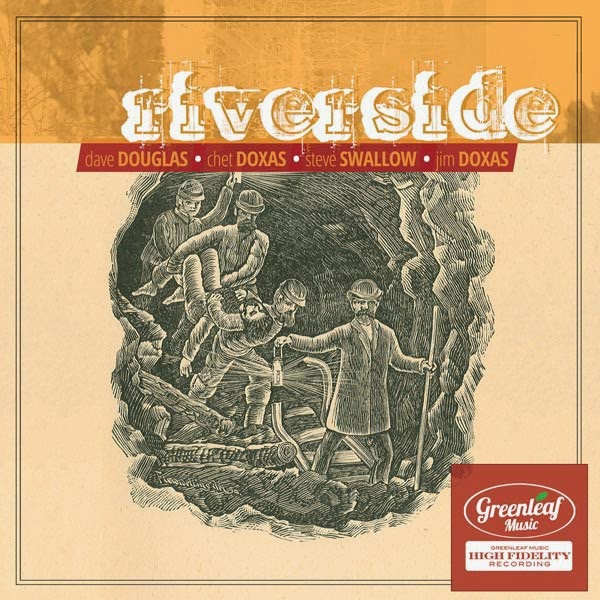By Paul Acquaro
The musical legacy of woodwind player and composer Jimmy Giuffre is one that is deeply intertwined with many of the recordings that are reviewed here on the Free Jazz Blog. Giuffre’s album Free Fall from 1962 with bassist Steve Swallow and pianist Paul Bley is often regarded as a seminal moment in the development of free jazz, introducing a subtle chamber music approach to free improvisation. However, in the years leading up to this watershed recording, Giuffre had a trio with guitarist Jim Hall and Ralph Pena that approached jazz with deference to deep American folk and country roots.
So, why all this talk about Giuffre’s music? Because trumpeter and composer David Douglas has put together a group that uses Giuffre’s earlier music as a jumping off point into an exciting pool of folk and blues inspired tunes that are as unabashedly fun as they are cleverly composed.
In this group, Riverside, Douglas is joined by Chet Doxas on sax, Jim Doxas on drums and original member of Giuffre’s early 1960’s Free Fall trio, Steve Swallow on bass guitar. Working mostly off of Douglas’ themes, the quartet spins playful melodies over spacious rhythms. The only direct cover is ‘The Train and the River’, which was a hit for Giuffre in 1956.
The opener, ‘Thrush’, is an uptempo romp beginning with a folksy melody that suggests wide open spaces and deep joy. Unison lines and counter melodies between clarinet and trumpet creates a distinct sound and is a feature throughout the recording. Jim Doxas’ drumming helps the music float beautifully. Even during the more intense moments toward the track’s end, the group is bouyant.
‘The Train and the River’ follows, and it’s a fine interpretation. Updating elements of the song, for example playing the melodic statement stronger and intensifying the blues elements, highlights the catchy melody. The song is brief here, letting the rhythms and original melody shine through.
Swallow’s solo intro to ‘Old Church New Paint’ is a gentle melody played with deep feeling. When the group joins, they settle into a laid back gospel feel that wrings a certain joy out of the melancholy. Another highlight is the taut ‘Back Yard’. At times rollicking, the trumpet and sax bounce lines off of the solid rhythm, countering each other at times and delivering punchy unison melodies. The closing ‘Sing on the Mountain High/Northern Miner’ builds slowly from a forlorn melody and atmospheric textures to a reserved climax. Douglas’ trumpet is bright and singing and sets up Doxas, who delivers a tense saxophone solo.
Overall, Riverside is a great collection of compositions album that is free in spirit and feeling. It’s not a tribute album, or an album of covers or interpretations, rather it’s inspired by and suggestive of Giuffre’s inventive folk-jazz approach. Douglas’ gifts as a composer and the group’s sympathetic interplay make it something that stands firmly, and wonderfully, on its own.
The album comes out next week, but check it out here.


